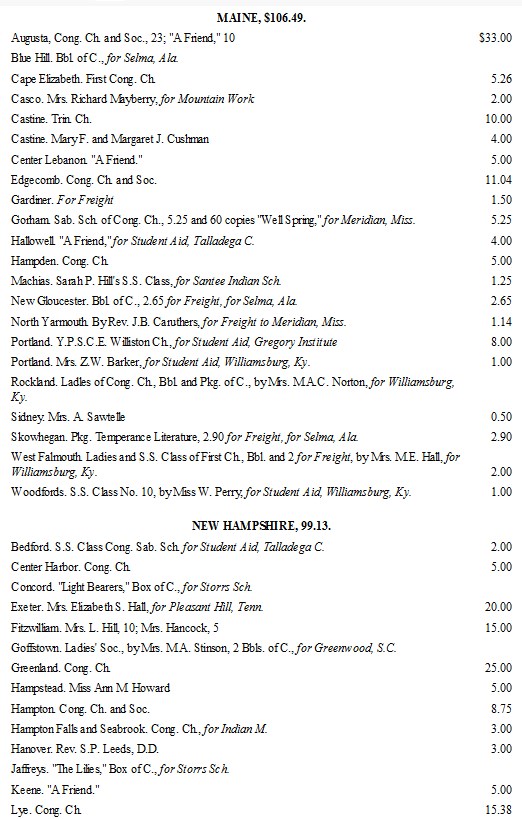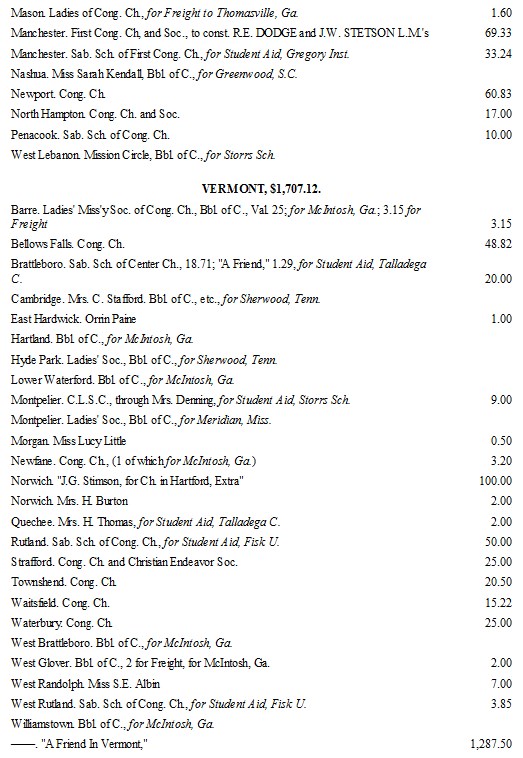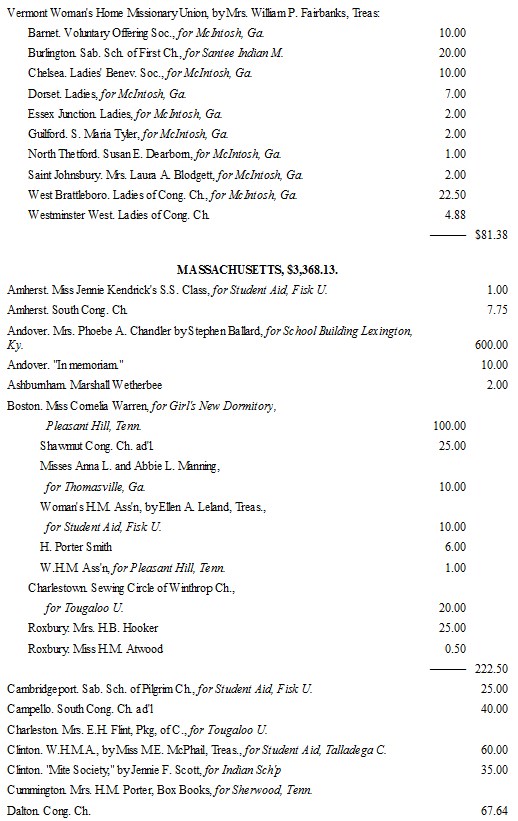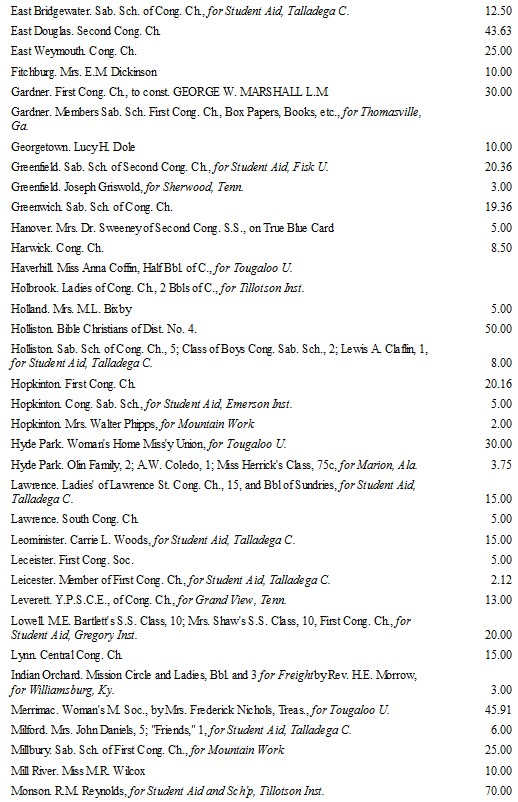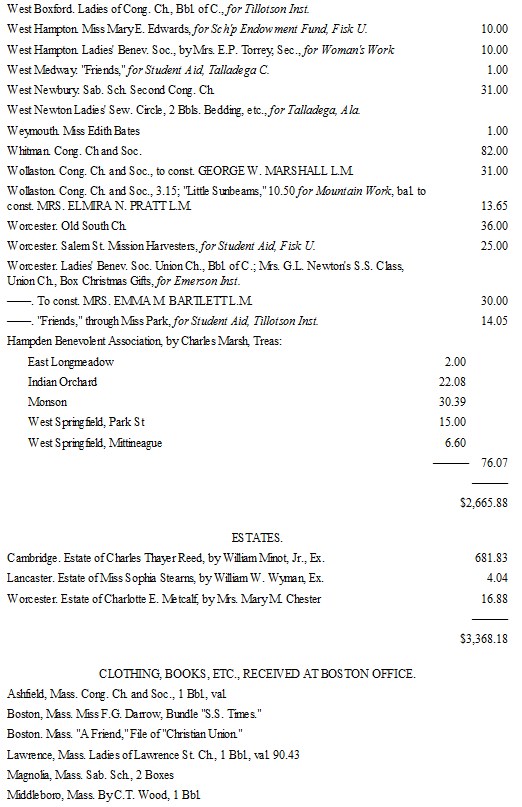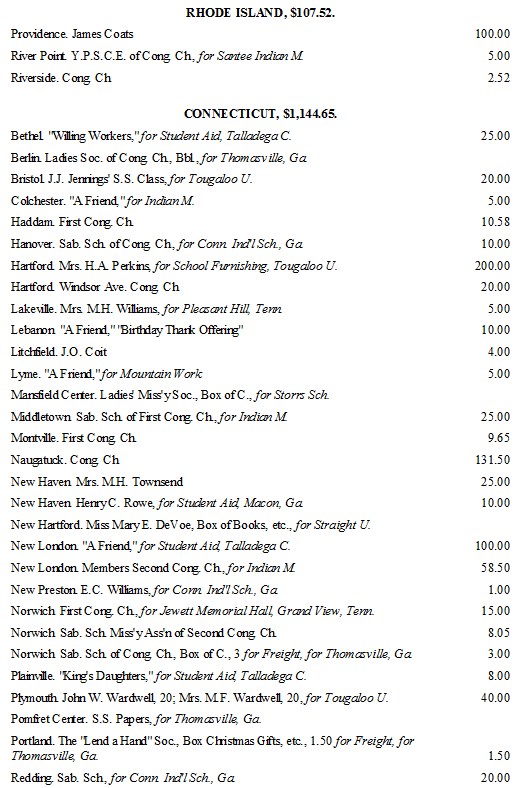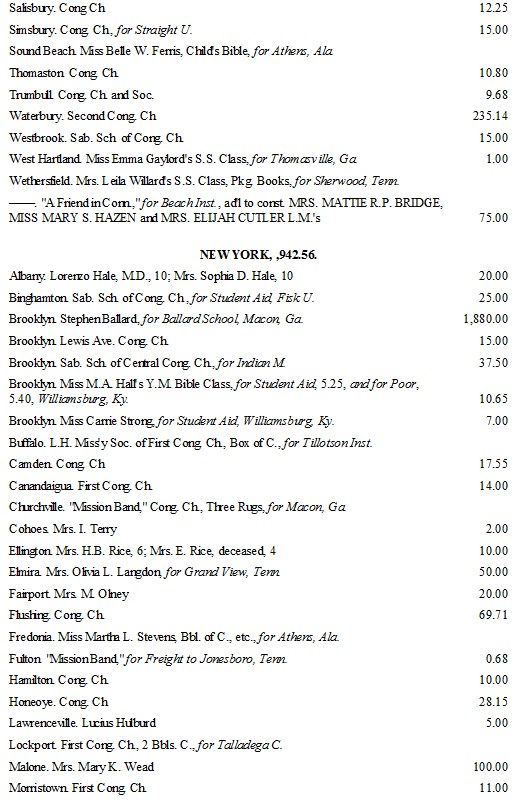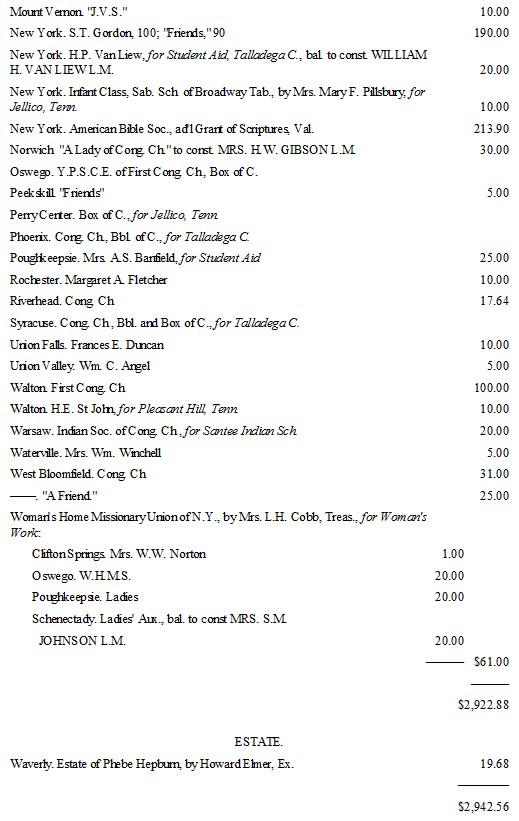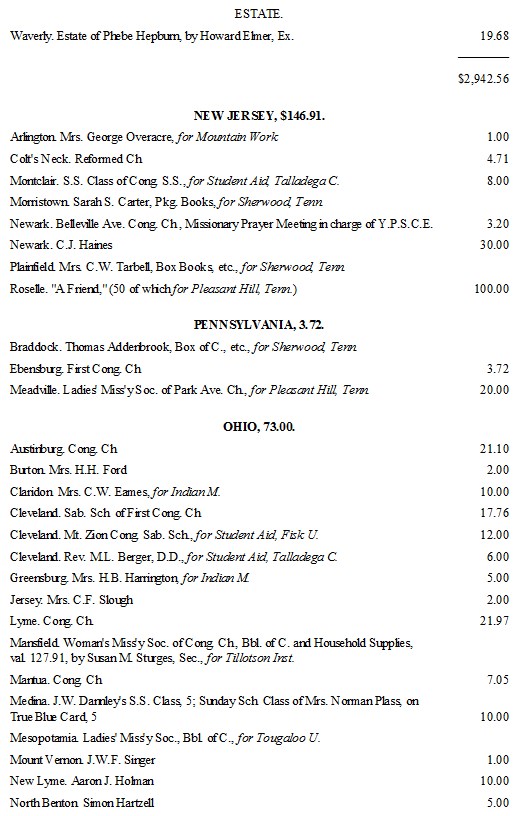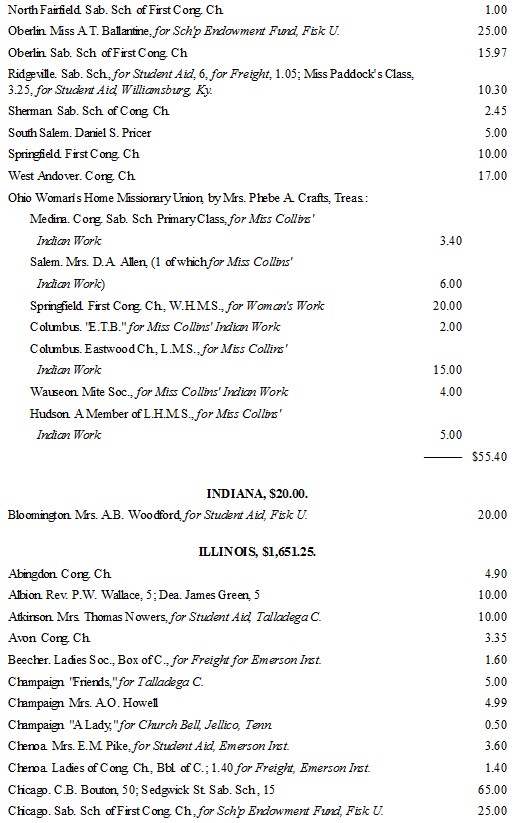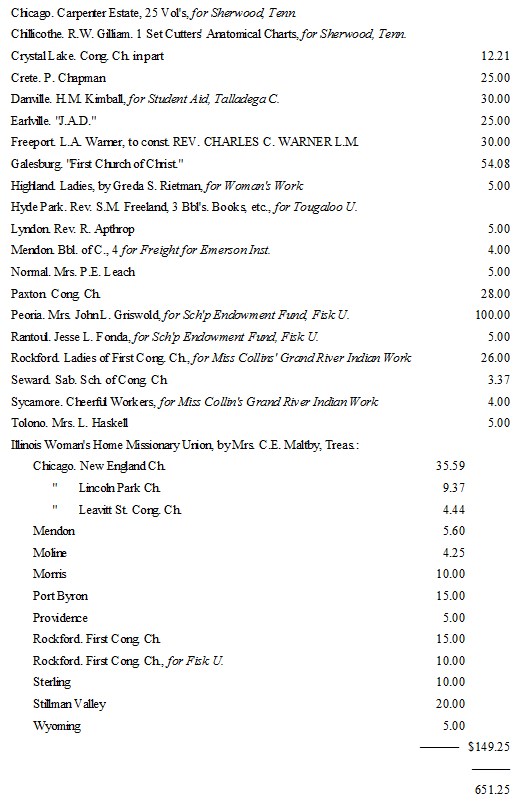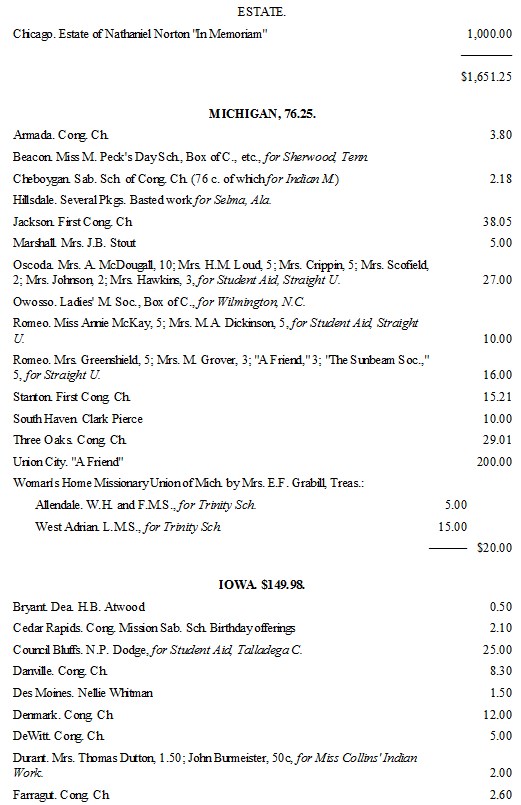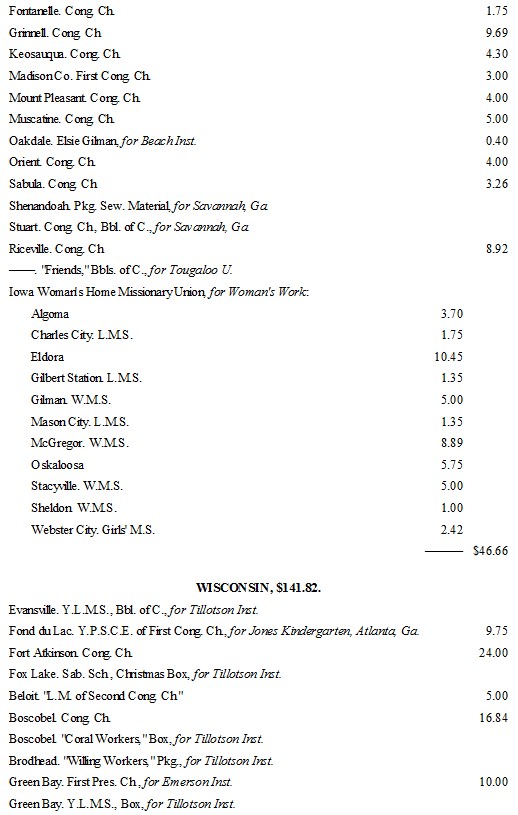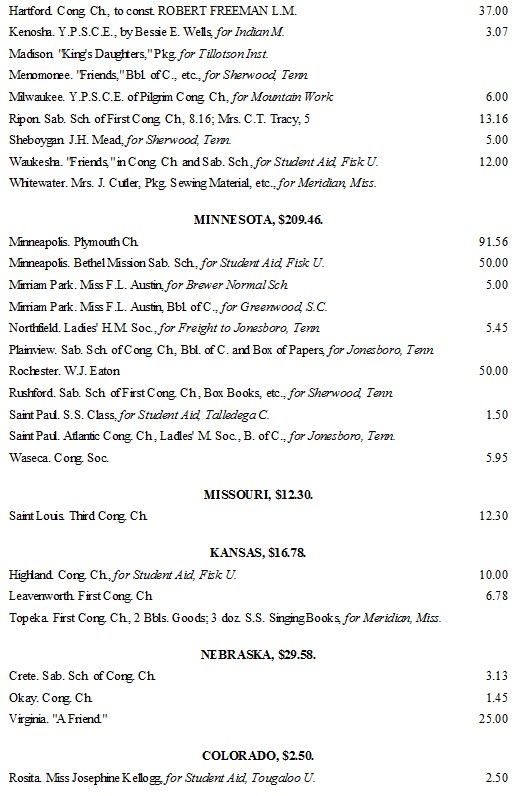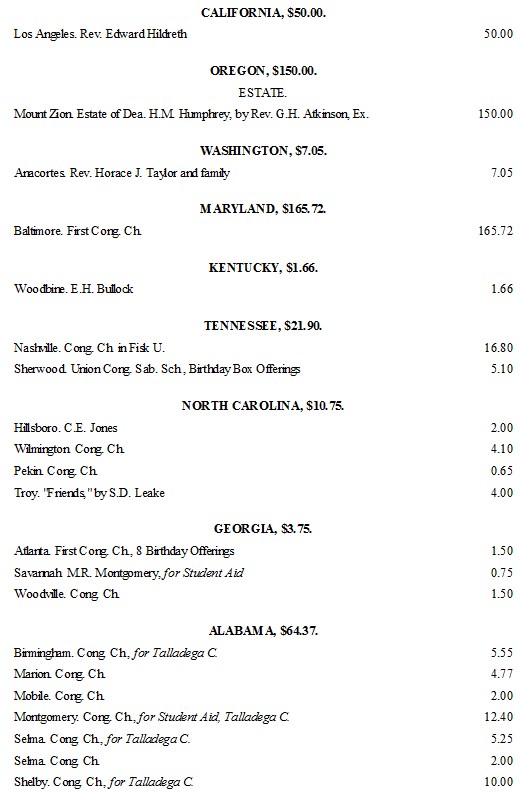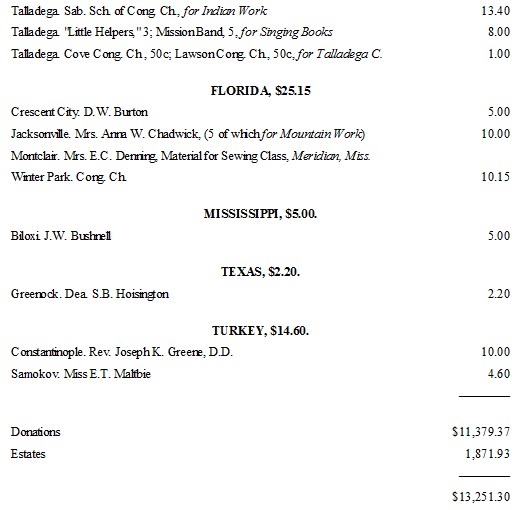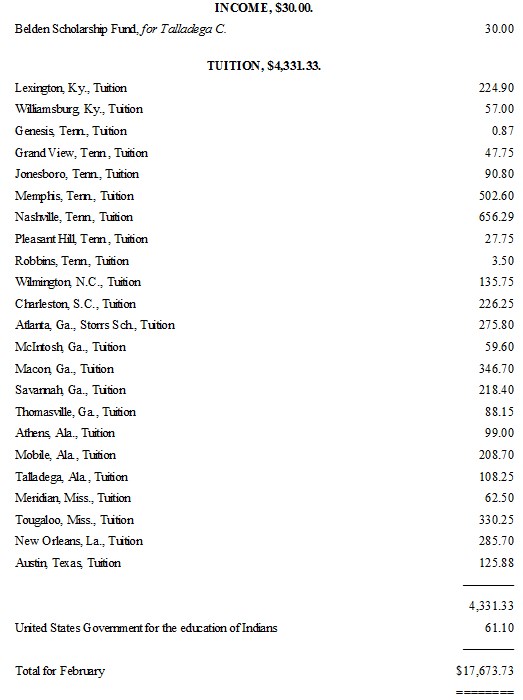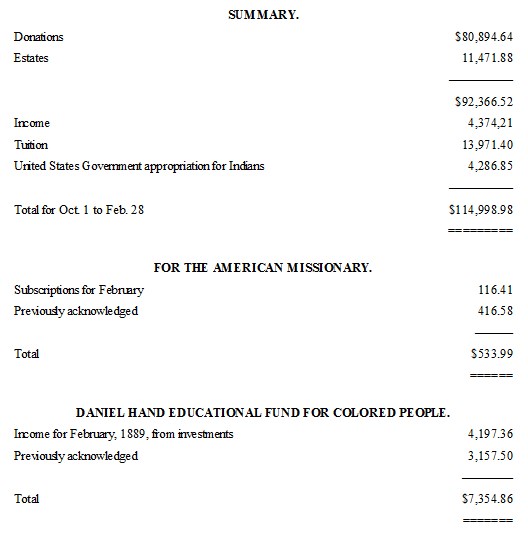 Полная версия
Полная версияПолная версия:
The American Missionary. Volume 43, No. 04, April, 1889
While you work for the schools, pray, also, for the work of the out-stations; pray that the light may shine into the darkened hearts so near us, pray that those who are living among them to teach them of the Saviour of men may be granted wisdom and strength to teach and live aright, that many souls may be won for Him whose servants we all are.
THE CHINESE
SAN DIEGO CHINESE MISSION
BY REV. J.B. SILCOXThe anniversary of the Congregational Chinese School at San Diego, organized about six years ago, was held in the Congregational Church on Sunday evening, February 10th. The church, capable of seating about five hundred and fifty, was filled to its utmost capacity. There were about thirty Chinese scholars present. The services were conducted by Rev. Dr. Pond, who had come down from San Francisco for the purpose of visiting the missions in Southern California. The pastor of the church, Rev. J.B. Silcox, assisted in the opening services. The Chinese boys were catechized by Dr. Pond, and showed by their answers that they were being grounded in the fundamental truths of the Bible. Lum Goon Kee recited the Twenty-third Psalm, and Chung Chong the Ten Commandments, and another "The Apostles' Creed." The first and second commandments received a new meaning to us as we heard them recited by one who until recently bowed himself down to graven images of God and the devil in the Joss house. They sang Christian hymns in Chinese and English. Charley Nun gave an address in which he testified to the benefits in being "a Jesus boy." Hom Gee had written and read the story of his conversion to Jesus. It was interesting to listen as they told how they were led out of darkness into light, and asked for the prayers of all good Christians. The audience felt that human hearts are the same the world over, and that the Holy Ghost had been given unto them, "even as unto us." The address of Low Quong would convince the most skeptical of the power of the gospel to purify the heart, illumine the mind and elevate the life and character of the Chinamen as well as others. He spoke in good English, and by his clear putting of the gospel truth, touched the hearts of all. The service made many converts. It convinced the hearers that the Chinaman was made in the image of God and is included in the "every creature," to whom the gospel is to be preached.
There are about one thousand Christian Chinamen connected with the Congregational Churches of California and Oregon. They contribute about $2,500 for home mission work and have organized a foreign missionary society, and with $1,400 as a starter, have sent two missionaries, one a Chinaman, back to China to do work there.
There is considerable opposition to Chinamen in this State. It does not wholly arise from "sand lot" orators either. These "little brown men" are industrious, patient, cheerful, obliging. They make the best of servants. But the average working man of America cannot compete with him in the labor market, and I would be sorry if he could. I hope the day will never come when the working man of America will be reduced to such cramped conditions of home life as "The heathen Chinee" luxuriates in. Paganism can live where Christianity cannot. A hut will do for a pagan Zulu. When he becomes a Christian, he wants a shirt and a house. "Chinatown" in any California city, and especially in San Francisco, where sixty or seventy thousand are housed and herded in a few blocks, will open the eyes of Eastern men as to the wisdom of restricting Chinese immigration. But there is no question as to our duty to those that are here. We cannot afford to let them live and die in their heathen vices. The best solution of the Chinese problem is to Christianize those that are here. The best way to reach China with the gospel is via California. Make Christians of these and they will become missionaries to their brethren across the Pacific.
BUREAU OF WOMAN'S WORK
WOMAN'S STATE ORGANIZATIONS
CO-OPERATING WITH THE AMERICAN MISSIONARY ASSOCIATIONME.—Woman's Aid to A.M.A.
Chairman of Committee, Mrs. C.A. Woodbury, Woodfords, Me.
VT.—Woman's Aid to A.M.A.
Chairman of Committee, Mrs. Henry Fairbanks, St. Johnsbury, Vt.
VT.—Woman's Home Miss. Union
Secretary, Mrs. Ellen Osgood, Montpelier, Vt.
CONN.—Woman's Home Miss. Union
Secretary, Mrs. S.M. Hotchkiss, 171 Capitol Ave., Hartford, Conn.
N.Y.—Woman's Home Miss. Union,
Secretary, Mrs. William Spalding, Salmon Block, Syracuse, N.Y.
ALA.—Woman's Missionary Association
Secretary, Mrs. G.W. Andrews, Talladega, Ala.
OHIO.—Woman's Home Miss. Union
Secretary, Mrs. Flora K. Regal, Oberlin, Ohio.
IND.—Woman's Home Miss. Union
Secretary, Mrs. W.E. Mossman, Fort Wayne, Ind.
ILL.—Woman's Home Miss. Union
Secretary, Mrs. C.H. Taintor, 151 Washington St., Chicago, Ill.
MINN.—Woman's Home Miss. Society
Secretary, Miss Katharine Plant, 2651 Portland Avenue, Minneapolis, Minn.
IOWA.—Woman's Home Miss. Union
Secretary, Miss Ella B. Marsh, Grinnell, Iowa.
KANSAS.—Woman's Home Miss. Society
Secretary, Mrs. G.L. Epps. Topeka, Kan.
MICH.—Woman's Home Miss. Union
Secretary, Mrs. Mary B. Warren, Lansing, Mich.
WIS.—Woman's Home Miss. Union
Secretary, Mrs. C. Matter, Brodhead, Wis.
NEB.—Woman's Home Miss. Union
Secretary, Mrs. L.F. Berry, 724 N Broad St., Fremont, Neb.
COLORADO.—Woman's Home Miss. Union
Secretary, Mrs. S.M. Packard, Pueblo, Colo.
DAKOTA,—Woman's Home Miss. Union
President, Mrs. T.M. Hills, Sioux Falls;
Secretary, Mrs. W.R. Dawes, Redfield;
Treasurer, Mrs. S.E. Fifield, Lake Preston.
We would suggest to all ladies connected with the auxiliaries of State Missionary Unions, that funds for the American Missionary Association be sent to us through the treasurers of the Union, Care, however, should be taken to designate the money as for the American Missionary Association, since undesignated funds will not reach us.
NOTICE OF A CONFERENCE OF OFFICERS OF THE WOMAN'S STATE HOME MISSIONARY ORGANIZATIONS
The Woman's State Home Missionary Organizations will hold an all-day meeting in the Congregational Church, Saratoga, Tuesday June 4, 1889, the day before the Annual Meeting of the American Home Missionary Society.
All State Organizations working through one or more of our six National Societies for Home-land Evangelization are cordially invited to participate in this meeting. It is hoped that there will be a large and able representation from each organization.
There will be two sessions. The morning session will begin promptly at 10:30, the afternoon at 2 o'clock. The morning session is to be a private business conference of State officers only. Questions of the greatest importance are to be freely and thoroughly discussed. State officers of every rank will be admitted to it.
To the afternoon session, all ladies interested in home-land work are most cordially invited. A rich, spirited and helpful programme is to be presented. Further information can be obtained by addressing
MRS. J.A. BIDDLE,South Norwalk, Conn.TEMPERANCE WORK IN TENNESSEE
I have been working in this State for three years, giving mothers new ideas, making them think in their log cabins, and causing many to say, "You have done me good." I am now on the Cumberland Plateau with my husband, who is in the employ of the American Missionary Association. A few weeks ago, I went with him to a mining town to assist him and Brother Pope in a series of meetings. There were early indications of popular interest, the crowd was easily gathered and the good work began much sooner than the most sanguine anticipated. The first week passed. Sinners had risen for prayers, strong men bowed their heads, confessing their sins, and conversions were daily reported. Then came a momentary lull, such as is often observed in revival seasons. Mr. Pope's experienced eye was quick to divine the cause. He knew that crowd of eager listeners—that there were many among them, old and young, who stood on the verge of the Kingdom with the fatal cup in their hands. Said he to me, "The time has come for a temperance talk—that is what they need!" and designated that very evening for me to present the subject.
At this I confess I was not a little embarrassed, for although accustomed to short, informal temperance talks in public, I had no idea, woman that I was, of taking his place at such a critical moment. What added to my embarrassment was the disheartening fact to all of us that Mr. Pope was just then unexpectedly called away to another part of his extensive field and was gone two days. So there was no help for it. I looked over my old notes—nothing would do. Then I inquired of the Lord, and He said "Fear not." Here let me remark, that I have hitherto encountered in this needy part of the country an obstinate prejudice against this "Woman's Temperance Work" by the women themselves, the most interested party in it. But here, thanks be to God, I met a most favorable reception. How the people looked, how earnestly they listened also, yes, and wept, as I told them of the world-wide Woman's Christian Temperance Union, and warned them of that fatal sin which was keeping many women out of the Kingdom of Heaven, and they knew it. I talked in my simple way of human love in its various phases, and then turned to the incomparable love of Christ, who would save them if they would only let him. In conclusion I asked—"Is there any one here, man, woman or child, in this congregation, who is willing to forswear the intoxicating cup henceforth and forever? If there is, let him come forward and take me by the hand." With scarcely a pause, the main body of the audience in the rear (you know what that means) rose from their seats and literally precipitated themselves upon the speaker's stand. For the next half hour I had nothing to do but to shake hands and pin the white ribbon. I never witnessed a more exciting scene. The tearful joy of suffering wives over their sobered husbands, and anxious parents over their wandering boys will not be forgotten.
The happy result of this first meeting of the kind created a demand for its repetition on two other occasions, as the revival went on with equal enthusiasm and success. In the course of our visitation from house to house, a Northern lady who had come down here to winter with her brother on account of her health, informed me of the disgusting revels of a certain man and his wife with their half-dozen drunken boarders, which she was compelled to witness in the other end of the house weekly, or as often as pay-day came around. "I can't bear it," said she. "Are you then praying," said I; "Where is your faith?" A few day's later, at the mother's meeting, another woman said, with much feeling, "Won't you present the temperance cause again tonight? My husband and several others wish to join your organization." I did. And who were the first to present themselves as candidates for the white ribbon but that same woman and her husband? Twenty-three others in the congregation followed suit, and all again stood forth hand in hand—token of unbroken friendship—a spectacle to angels and mortal man. By this time, to our great joy, Brother Pope had returned, and he assigned me to my proper place after one of his own rousing appeals.
To give you a general idea of the power of this work, which continued with unflagging interest to the last, allow me to cite two or three instances of conversion. One, a man who had shot and killed three notorious burglars, was tried for legal informality and acquitted on the ground of the public weal. This was two years ago, and the people who knew and understood him well, said that he had enjoyed no peace of mind since. Notwithstanding all, he was, and is, a man of power and commanding influence, and has entered heartily into the work and interests of the A.M.A., as Brother Pope can assure you. Another, a younger man, likewise implicated in a murder last Fourth of July, and committed to jail for a time, the particulars of whose case I am unacquainted with, cried out in open congregation, "Pray for me, I am the vilest sinner that ever lived," and dropped upon his knees in sore agony of body and soul to join in prayer with the Christians present. As the latter arose and began singing, "Come, humble sinner," he stepped right forward exclaiming, "By the grace of God I will, I will," and at that moment the great change might be read in the heavenly expression of his changed countenance. Yet another young man, a boon companion in sin, cried out in the same way and came forward kneeling for some time, and then rising said, "I have found God; he is good; come, my friends, and find him, O come," repeating these words as he passed through the wondering congregation till he came to me, when grasping my hand, he exclaimed, "Praise the Lord that ever he sent you to this place." He was asked to pray. "Yes, yes," was his instant reply, "that is just what I want to do;" and such a prayer as he offered up is seldom heard. A well-known skeptic arose and openly renounced his infidelity.
As my husband and Brother Pope had both their special appointments elsewhere to fill, it fell to my lot, much against my predilections, to close the whole series of meetings by my third and last temperance lecture. This appeal on the temperance question was also responded to, at first mostly by young boys and girls, followed by a venerable gentleman and his two sons, and then the full complement of men and women. So all discouragements of the past are forgotten in these glorious results.
FOR THE CHILDREN
CHRISTMAS AT THE S'KOKOMISH RESERVATION
BY REV. MYRON EELLSOur Christmas passed off very pleasantly, with a tree and appropriate exercises in the evening. The church was full, with the school children, about forty-five in number, the older Indians, government employees, and a number of surrounding whites. Two songs were sung by the whole school, one being an original piece beginning with the words, "We're from Squakson and S'kokomish," (the two reservations from which the children have come,) and containing the names of all the children in school. The other, "Hurrah for the Christmas Tree" was sung just before the gifts were distributed. There were other songs by the older pupils, the youngest children closing with the clapping of their hands. Two Indian girls played the organ. Nine little girls recited a hymn, each one beginning with the successive letters of the word Christmas, and as they did so, those letters were hung up between them and the audience. Ten little boys recited a poem on temperance, in connection with which the Indian policeman, recently appointed, made some earnest remarks on the same subject. It was his first effort in church, and he surprised his friends by his success. An Indian chief spoke about Christmas, and your missionary added remarks on the meaning of the word Christmas—the feast of Christ.
A report of the Sabbath-school showed that there had been an average attendance of forty-five. Prizes having been offered to all those who should be on the roll of honor four-fifths of the time, by learning the Sabbath School lesson—three verses in advance and three in review— perfectly, it was found that five had gained a prize, a good book each, two of them being Indian children, and the others white children.
The gifts from the tree were then distributed. None of the children were omitted; some went home so loaded that they could hardly carry all, and even many of the oldest, decrepit Indians who could not be present, were not forgotten.
A violin and organ solo by the school teacher and his wife called the audience again to order, and an exhibition followed with a small magic lantern and about eighty pictures, Bible, temperance and comic. This I have used in my tours with the Indians, and it is always acceptable. The remark was made more than once, "How well the children performed their parts."
RECEIPTS FOR FEBRUARY, 1889
